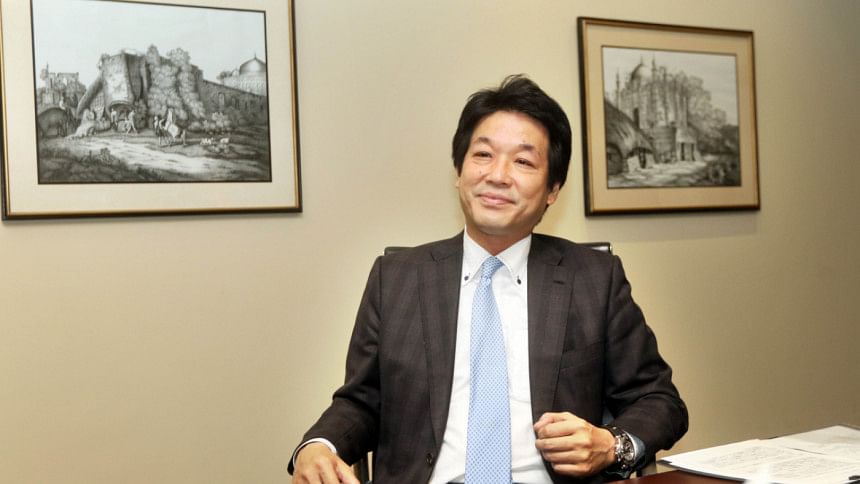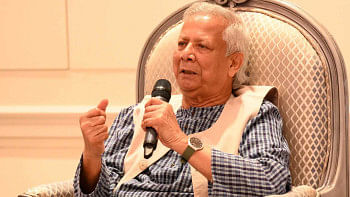Freedom of the seas: A cornerstone of economic growth

Special Advisor to the Prime Minister of Japan, Kentaro Sonoura, recently visited Bangladesh to attend the inauguration of the construction work of a coal-fired power plant at Matarbari on January 28. In an exclusive interview with The Daily Star's Rezaul Karim, he talks about the Free and Open Indo-Pacific Strategy and its implications for the region.
What is the philosophy behind the Free and Open Indo-Pacific Strategy?
First of all, we are talking about the freedom of the seas, that is to say, anyone can have access to the seas. I believe this is a cornerstone of economic growth and is a view widely shared and recognised by the international community. No one can claim a sea or an ocean as their own, but matters pertaining to them must be handled through the rule of law.
The region encompassing ASEAN, Bangladesh, India, all the way up to the Middle East and also including Africa, hosts half of the world's population. In the 21st century, economic growth will mostly be driven by the countries of this region. The Free and Open Indo-Pacific Strategy (FOIP) is a basic strategy that we hope will maximise the economic prosperity of this region in the days to come.
The strategy has three core components. First, the freedom of navigation, as well as the rule of law related to that freedom, which must be recognised and respected by everyone. Second, it is to increase regional connectivity through the development of ports, harbours, roads as well as railways to enhance economic prosperity. And third, it is to address obstacles to prosperity such as natural disasters, piracy, etc.
We want to provide greater assistance to enhance the region's disaster response capacity and also improve its maritime security and capability. By extending all our support, we believe it would be possible to maintain peace and stability in the oceans of the Indo-Pacific.
How does Japan view Bangladesh's role in the FOIP?
When we look at the region that Bangladesh is a part of, you have China, which is the most populous country in the world, you have ASEAN, which is the growth centre of Asia, and you also have India, which is slated to become the country with the largest population in the future. Bangladesh is right at the centre of this whole region. So, you have an advantage in terms of the existing geopolitical situation.
Not only in geopolitics, you are now trying to pursue the Big-B initiative, which I believe is the concept shared by both Japan and Bangladesh. I believe both of us would utilise the sea or the ocean so that we will be able to see further growth moving forward. We will share the same values in that regard.
As I have been told, Chittagong port is in full capacity, which means your economy is very vigorous and revitalised. Just today (January 28), I have attended a ceremony inaugurating the construction work of the Matarbari Ultra Super Critical Coal fired power project. Matarbari is a wonderful initiative. And we wish to develop a port in Matarbari, so that we will be able to see further growth in the region. The port will become a major hub in that regard.
Furthermore, what is most important is that Bangladesh has already a track record of having resolved maritime boundary issues with India as well as with Myanmar through international institutions or tribunals, which means that amongst all the other things, Bangladesh places the greatest importance on the concept of the rule of law. Thus, we believe that Bangladesh can be one of our most important partners.
How does Bangladesh benefit from participating in the FOIP?
Let me ask you a question in return. Would you say that to build a big port will be advantageous to Bangladesh so that you will be able to further revitalise your trade? What do you think?
Yes, that will be highly beneficial to the people and the country.
So, that will be the answer. As the economy becomes bigger, naturally you would need more electricity. And you have already started to import gas. So you would have to import gas as well... meaning that if you are to bring in natural resources from outside and further bring prosperity to your economy.... What has been produced in Bangladesh—you now need to export to the outside market. In order to make these things happen, you definitely need the three concepts I have just described. You need to have the rule of law based on the sea or the ocean that you will be able to utilise and everybody will be able to navigate on such a sea; and you will be able to have connectivity with different countries and markets in the world; and you need to be protected from obstacles such as acts of piracy, so that you will be able to have a free and open sea that you will be able to utilise for yourself. Wouldn't that be an advantage for Bangladesh?
I do feel the potential of Bangladesh. And because the people of Bangladesh are very friendly towards Japan and the Japanese people, I believe those are the reasons why we see an increase in investment by the Japanese businesses into Bangladesh these days. Although we did have a sad incident recently, Japan will never give in to terrorism. I hope that we will be able to closely work together to see further security and prosperity.





Comments